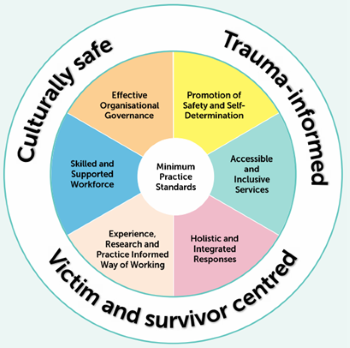The National Office for Child Safety engaged the Australian Centre for Child Protection at the University of South Australia (ACCP), in partnership with PricewaterhouseCoopers Consulting, to develop the national Minimum Practice Standards: Specialist and Community Support Services Responding to Child Sexual Abuse (the Standards).
Victims, survivors and their support system can face barriers when seeking help, including gaps in services, inadequate responses, and inconsistent service provision.
The Standards provide a set of principles and benchmarks to promote safe and effective service provision that supports individuals who have experienced or been impacted by child sexual abuse.
There are six Standards, underpinned by three overarching Core Values – Victim and Survivor Centred, Trauma‑Informed, and Culturally Safe:
- Promotion of safety and self-determination
- Accessible and inclusive services
- Holistic and integrated responses
- Experience, research, and practice informed way of working
- Skilled and supported workforce
- Effective organisational governance

> Read the Standards here
> Read the implementation guide and further resources here
The Standards represent collective wisdom from national consultations on the minimum threshold that specialist and community support services should be attaining in responding to child sexual abuse. The Standards are designed to guide service provision and can support or enhance work that may already be occurring in the sector. Services should be aware of and comply with any other relevant regulations or mandatory standards in their jurisdiction.
The Standards can guide service providers to assist victims, survivors, and their support system to make informed choices about the services they seek.
The Standards have been informed by relevant literature and in‑depth consultation with those with a lived experience of child sexual abuse, Aboriginal and Torres Strait Islander peoples, Commonwealth and State and Territory agencies and representatives, service providers and subject matter experts.
ACCP have also developed an implementation guide to provide examples of how an organisation could implement and show how they are meeting or working towards the Standards. The implementation guide also includes a self‑assessment tool for organisations to reflect on the Standards and identify areas for improvement.
The Standards form a key part of Measure 24 of the First National Action Plan of the National Strategy to Prevent and Respond to Child Sexual Abuse 2021-2030, to complete a baseline analysis of specialist and community support services responding to child sexual abuse. A summary report on this project will be released shortly.
The 18 month national project brought together significant research and clinical practice expertise, including expertise across the sector in academia, service design, practice, standards auditing and quality management.
Expertise included:
- Amanda Paton, Deputy Director Practice, ACCP, UniSA: Chief Investigator
- Dr Claudia Pitts, Director, PwC PIC: First Nations Australians Consultations
- Professor Leah Bromfield, Director, ACCP, UniSA; Expert Advisor
- Victoria Parsons, Research Assistant, ACCP, UniSA: Consultations; Reviews
- Kim Adamson, Quality and Audit Consultant for ACCP, UniSA: Expert Advisor; Standards Implementation and Testing
- Jenny Scott, Partner, PwC PIC: Expert Advisor; First Nations Consultations
- Professor Patrick O’Leary, Griffith University; Expert Advisor; Consultations
- Professor Vickie Hovane, Cultural Lead, ACCP, UniSA: Expert Advisor
- Sian Burgess, Practice Specialist, ACCP, UniSA: Expert Advisor
- Gina Horch, Research Assistant, ACCP, UniSA: Literature review and summaries
- Dr James Herbert, Senior Research Fellow, ACCP, UniSA: Literature review/ design
- Dr Martine Hawkes, Research Fellow, ACCP, UniSA: Consultation methodology



